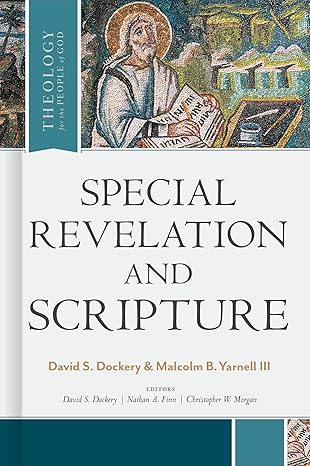A Brief Book Summary from Books At a Glance
by Steve West
Table of Contents
Introduction
- The Revelation of God
- The Two Ways of Revelation
- Natural Theology
- The Nature of Truth and the Nature of Scripture
- Jesus Christ and the Bible
- The Inspiration of the Bible
- The Preservation and Canonization of the Bible
- The Truthfulness and Inerrancy of Scripture
- The Sufficiency and Authority of Scripture
- From Biblical Interpretation to Theology, Part I
- From Biblical Interpretation to Theology, Part II
- The Bible in Baptist Life
Conclusion: Understanding and Applying the Bible Today
Summary
Chapter 1: Revelation
Holy Scripture is the living word of God by which he confronts people with eternal truth. God speaks in Scripture: “the word of Scripture is the Word of God.” The doctrines of God and Scripture are inseparable; theological ontology and theological epistemology cannot be divided. God is the God who speaks, and we know him by his Word. Scripture presents revelation as coming in various forms, but it is personal communication from God. The historical person of the Son of God is emphasized as climactic revelation; he is both “one with God and the human revelation of God.” Revelation can be described as an unveiling or uncovering. God reveals, discloses, makes visible, makes clear, and makes known. Logos and rhema are important revelation words, as is dabar in Hebrew. It is vital to recognize and affirm that revelation is both personal and propositional—the two are not contradictory, and the latter does not undercut the former. The words of the biblical text are truthful, and the truthfulness of the biblical propositions is not set aside by appealing to the Spirit. Propositional knowledge alone is not sufficient (i.e., we must know God, not merely things about God), but that does not mean that propositional knowledge is irrelevant. God reveals propositional truths for the purpose of relationship. We need to know propositional truths to interpret and understand events. Neither God nor Christ eschewed propositional revelation.
We should recognize an excellent contribution to personalist revelation from a thinker like Brunner, but also recognize that his definition lacks balance and requires additions by theologians like Carl Henry who argue for the propositional nature of revelation. Henry’s fifteen theses on divine revelation deserve careful attention and study. They highlight the role of the Spirit and helped evangelicals affirm the inerrancy and necessity of the written Word. Besides personal and propositional revelation, we need to understand that the Spirit empowers the church to proclaim the revealed gospel and call people to repentance and faith. We must understand revelation as the revelation of the Triune God; since revelation reveals God, and God is triune, revelation is only about the God who is Trinity. “By speaking of ‘divine revelation’ we mean that God the Trinity from his absolute transcendence overcomes human blindness in an act of unexpected grace by personally disclosing unusual and life-giving knowledge about God, his world, and his work from creation to consummation, with a focus on the incarnation and redeeming work of Jesus Christ. The Eternal Logos, Jesus Christ, reveals himself and his saving work rationally and verbally in the written Word of God originally inspired by the Holy Spirit, illumined by the Spirit to his church today, and proclaimed to the world in the power of the Spirit through his church.” . . .
[To continue reading this summary, please see below....]The remainder of this article is premium content. Become a member to continue reading.
Already have an account? Sign In
